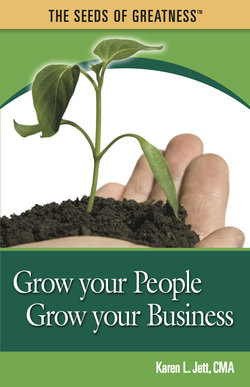Читать книгу Grow Your People, Grow Your Business - Karen Jett - Страница 8
На сайте Литреса книга снята с продажи.
Plan Your Field Organizational Skills
ОглавлениеIt can be amazingly easy to create new varieties of vegetables — all you really need to do is cross-pollinate two plants of the same type and suddenly you have a funny-tasting squash or a weird-looking cucumber. If your goal is to create a new variety, you’ve done your job. But a farmer who places two plants next to each other without forethought risks unexpected results from Mother Nature.
This is just one reason why it’s important for a farmer to plan fields carefully. Good farmers must plan the variety of vegetable best suited to their environment and customers, plan the timeframe available for growth, anticipate weather conditions, and use available space effectively. Crop rotation is also very important because when the same plants are placed in the same location year after year, the chance of disease increases exponentially.
As a manager, you also should be concerned with “planning your field.” This starts with you. Organized people accomplish more tasks, miss fewer deadlines and forget important events less often. Organization looks different for everyone, but if you have trouble completing all tasks, you miss too many deadlines, or you forget important things, you will likely benefit from improved organization.
If you understand organization, you will be able to coach your staff and help them become more organized. Is anyone on your staff underproductive? Do they miss deadlines, or forget to follow through on tasks? These staff members can benefit from better organizational skills. Who can model these skills and share them better than you, the manager?
Organization looks different for everyone because everyone thinks and works differently. A system that keeps you on task may be completely useless to someone else. And, over time, you may find that even your own proven systems evolve.
During my years in the workplace, I have tracked my responsibilities in many different ways. I have used manual systems and computerized systems. I have used lists and calendars. I have even used systems that make a noise to remind me of appointments. Over time, I have discarded one after the other as being inadequate for my needs. I have finally settled on a combination of systems that are mostly manual, with a few electronic elements. But even my current preferred system will change eventually.
As you begin to organize yourself or your staff, keep a few guidelines in mind. First, figure out what is already working well for you. You don’t want to spend a great deal of time or money to improve your ability to remember daily tasks if this is not an issue for you.
Second, figure out what is broken. In what duties are you repeatedly having trouble? Are you missing deadlines? Are you losing important papers? Are you constantly late for appointments? Are you totally forgetting meetings — even ones that you scheduled? If you are not sure where you should be looking, I invite you to visit my website (www.JettExcellence.com) and take the free survey, “13 Ways to Keep My Stuff Under Control.” It will help you to identify the areas in which you need to improve.
Once you’ve figured out where you need the most help, you are ready to make some changes. It’s quite possible, in fact likely, that you have no idea how to do things differently. In that case, it’s time to talk to others who excel in this area. Talk to the coworker, friend, or relative who always knows the location of every key piece of paper. Let her know how much you admire her organization and ask if she’s willing to share how she accomplishes this admirable feat. Alternatively, buy a book or attend a seminar about organizational skills.
As you search for help, remember to look for a system that feels natural to you in at least one aspect. You are looking for a system that will free you, not one that will enslave you. And please, don’t use my words as a cop-out: “Karen said I shouldn’t try it if it doesn’t feel comfortable, therefore, I’m not going to try anything new.”
The best way to find a good system is to test many, and keep the parts that work for you. As you sift through the systems, many will feel awkward when you begin to use them. Any new way of working is likely to feel awkward at first.
What are the benefits of all this work? Well, you’ll be less likely to create unintended new breeds of vegetables — any new hybrids will be totally intentional.
By planning your field, you will be more efficient and feel more in control. Instead of bouncing from one event to the next at the last minute, you will be prepared and ready to make a good impression. You will be able to rotate your crops and balance the overly busy times with the slower times. You may even free up that extra chair in your office so it can be used by your staff for training and coaching rather than by a stack of disorganized papers three feet high.
Are you ready to plan your fields?
Quick Tips to Grow Your People:
•Get more done in the same amount of time by becoming more organized.
•Take the free survey, “13 Ways to Keep My Stuff Under Control” online at www.JettExcellence.com.
•Ask others who are more organized to share how they do it.
•Try out many systems and keep only the parts that work well for you.
